I have a X509Certificate (version 1) instance in Java and I need to identify if it is a CA certificate or user certificate.
I tried this How to check if X509Certificate is CA certificate?, but with the solutions provided there i could differentiate the certificates which has certificateExtension (by utilising getBasicConstraints() method and checking the keyCertSign flag in keyUsage ie V3 certificates will have extension field which v1 or v2 wont have)
if (x509Cert != null) {
isCA = x509Cert.getBasicConstraints() != -1 ? true : false;
}
but I've few certificates that doesn't have certificateExtension field in the X509Certificate instance(as they are V1 version certificates), so i'm getting isCA flag as false. Also i tried decoding the certificate in online ssl decoders like https://certlogik.com/decoder/ there i can be able to differentiate the certificate type!
Any other approach to programmatically find the type of certificate that doesn't have certificateExtension?
sample CA cert:
-----BEGIN CERTIFICATE-----
MIICWjCCAcMCAgGlMA0GCSqGSIb3DQEBBAUAMHUxCzAJBgNVBAYTAlVTMRgwFgYD
VQQKEw9HVEUgQ29ycG9yYXRpb24xJzAlBgNVBAsTHkdURSBDeWJlclRydXN0IFNv
bHV0aW9ucywgSW5jLjEjMCEGA1UEAxMaR1RFIEN5YmVyVHJ1c3QgR2xvYmFsIFJv
b3QwHhcNOTgwODEzMDAyOTAwWhcNMTgwODEzMjM1OTAwWjB1MQswCQYDVQQGEwJV
UzEYMBYGA1UEChMPR1RFIENvcnBvcmF0aW9uMScwJQYDVQQLEx5HVEUgQ3liZXJU
cnVzdCBTb2x1dGlvbnMsIEluYy4xIzAhBgNVBAMTGkdURSBDeWJlclRydXN0IEds
b2JhbCBSb290MIGfMA0GCSqGSIb3DQEBAQUAA4GNADCBiQKBgQCVD6C28FCc6HrH
iM3dFw4usJTQGz0O9pTAipTHBsiQl8i4ZBp6fmw8U+E3KHNgf7KXUwefU/ltWJTS
r41tiGeA5u2ylc9yMcqlHHK6XALnZELn+aks1joNrI1CqiQBOeacPwGFVw1Yh0X4
04Wqk2kmhXBIgD8SFcd5tB8FLztimQIDAQABMA0GCSqGSIb3DQEBBAUAA4GBAG3r
GwnpXtlR22ciYaQqPEh346B8pt5zohQDhT37qw4wxYMWM4ETCJ57NE7fQMh017l9
3PR2VX2bY1QY6fDq81yx2YtCHrnAlU66+tXifPVoYb+O7AWXX1uw16OFNMQkpw0P
lZPvy5TYnh+dXIVtx6quTx8itc2VrbqnzPmrC3p/
-----END CERTIFICATE-----
It's X509
[
[
Version: V1
Subject: CN=GTE CyberTrust Global Root, OU="GTE CyberTrust Solutions, Inc.", O=GTE Corporation, C=US
Signature Algorithm: MD5withRSA, OID = 1.2.840.113549.1.1.4
Key: Sun RSA public key, 1024 bits
modulus: 104674226241368487598835828377585222181792546532354327780214427055917513664449991602803276678454577364904540367827644455215731003386468752240014232146814457308076052176227490263634768927290191763858631579785604655038492469791381988347440106477066514204303723029602991655085187937840556671697442212352844587673
public exponent: 65537
Validity: [From: Thu Aug 13 05:59:00 IST 1998,
To: Tue Aug 14 05:29:00 IST 2018]
Issuer: CN=GTE CyberTrust Global Root, OU="GTE CyberTrust Solutions, Inc.", O=GTE Corporation, C=US
SerialNumber: [ 01a5]
]
Algorithm: [MD5withRSA]
Signature:
0000: 6D EB 1B 09 E9 5E D9 51 DB 67 22 61 A4 2A 3C 48 m....^.Q.g"a.*<H
0010: 77 E3 A0 7C A6 DE 73 A2 14 03 85 3D FB AB 0E 30 w.....s....=...0
0020: C5 83 16 33 81 13 08 9E 7B 34 4E DF 40 C8 74 D7 ...3.....4N.@.t.
0030: B9 7D DC F4 76 55 7D 9B 63 54 18 E9 F0 EA F3 5C ....vU..cT.....\
0040: B1 D9 8B 42 1E B9 C0 95 4E BA FA D5 E2 7C F5 68 ...B....N......h
0050: 61 BF 8E EC 05 97 5F 5B B0 D7 A3 85 34 C4 24 A7 a....._[....4.$.
0060: 0D 0F 95 93 EF CB 94 D8 9E 1F 9D 5C 85 6D C7 AA ...........\.m..
0070: AE 4F 1F 22 B5 CD 95 AD BA A7 CC F9 AB 0B 7A 7F .O."..........z.
]
when decoding the certificate file content it is shown as CA cert
 Thanks in advance!
Thanks in advance!